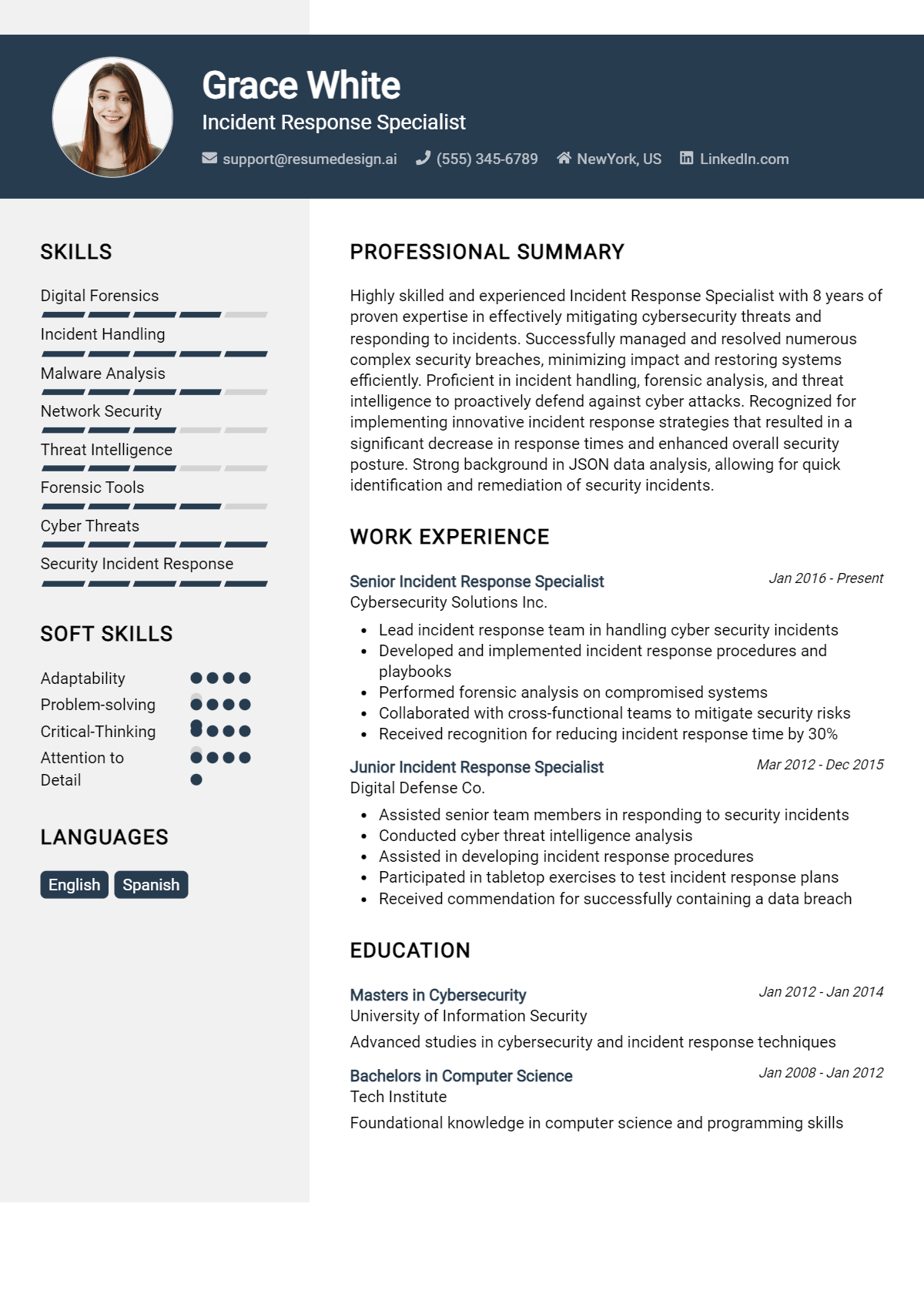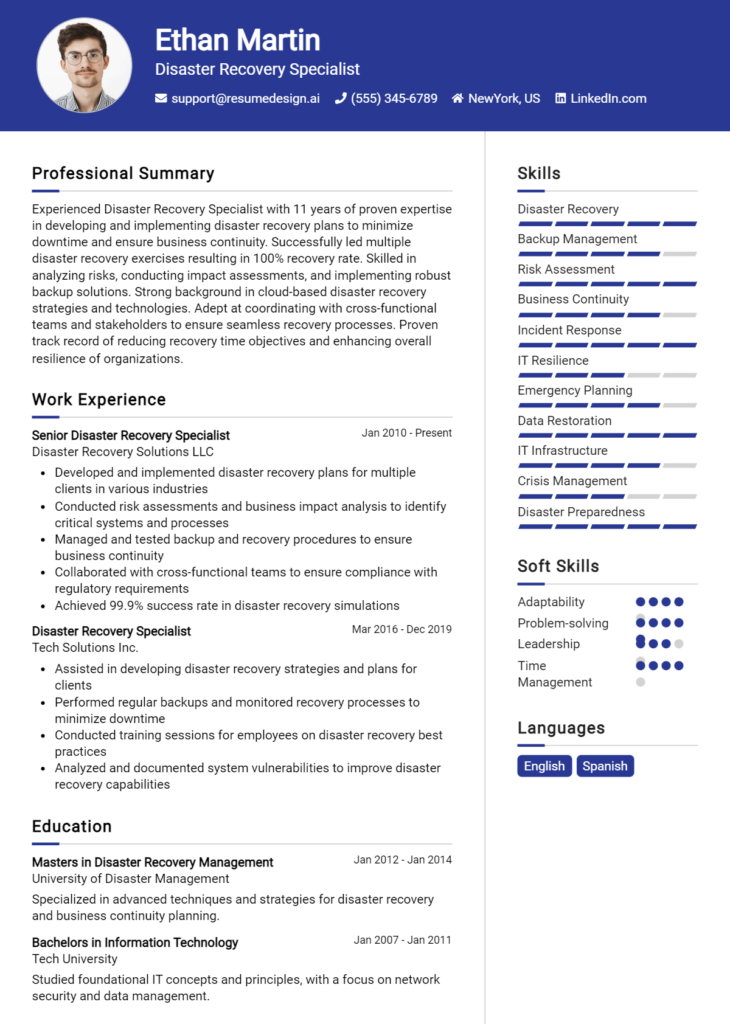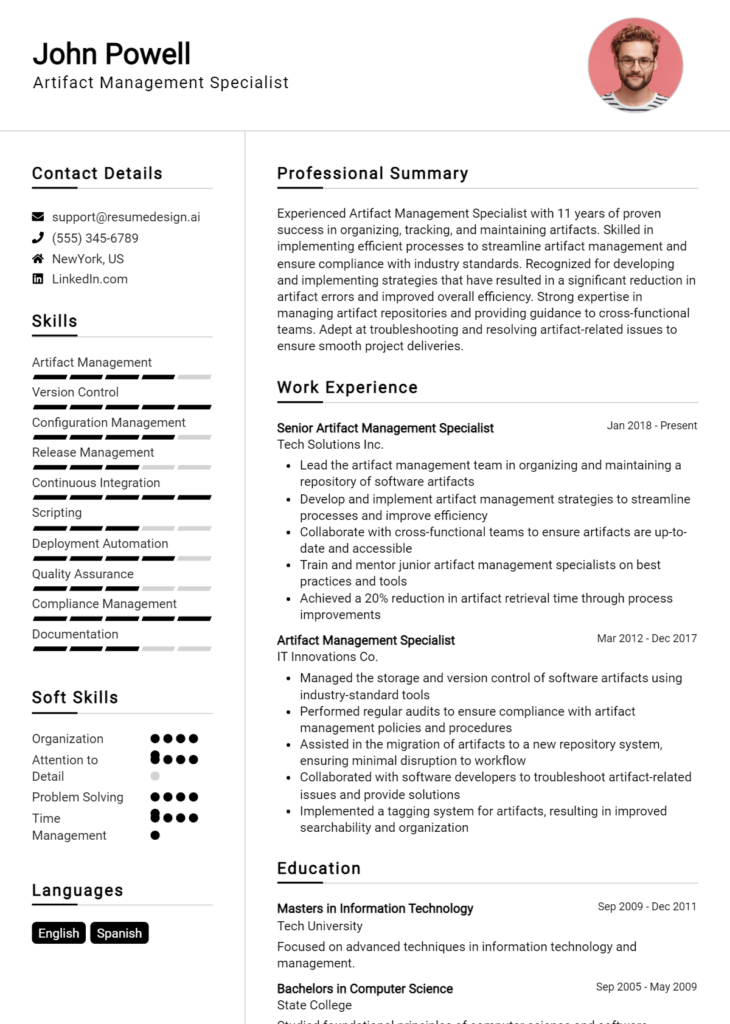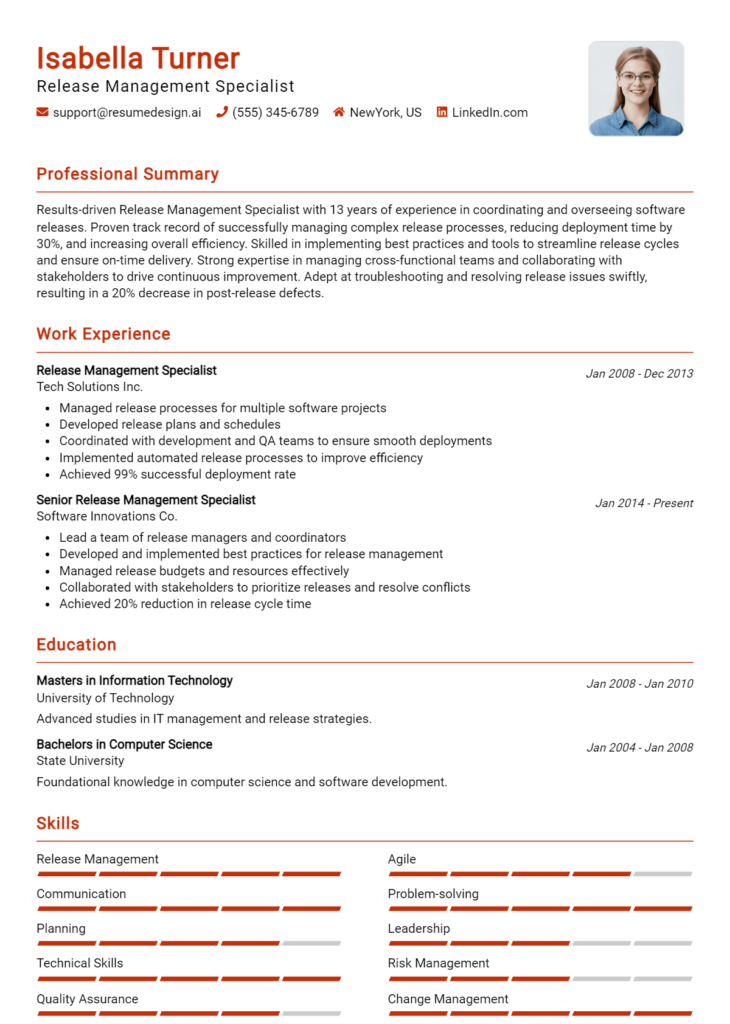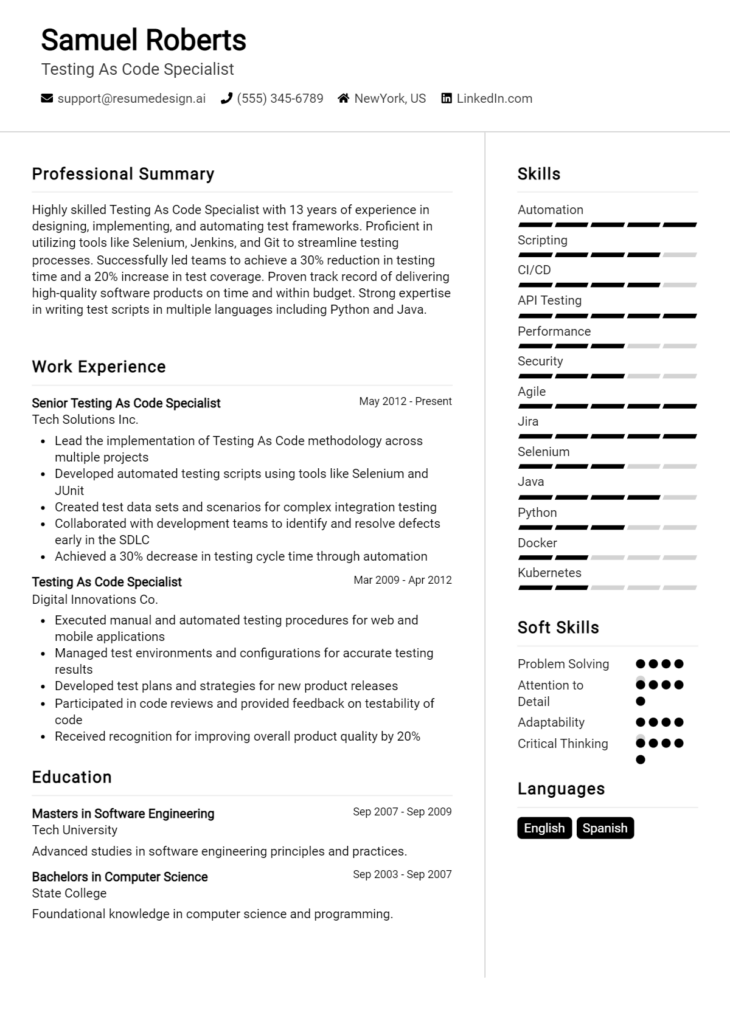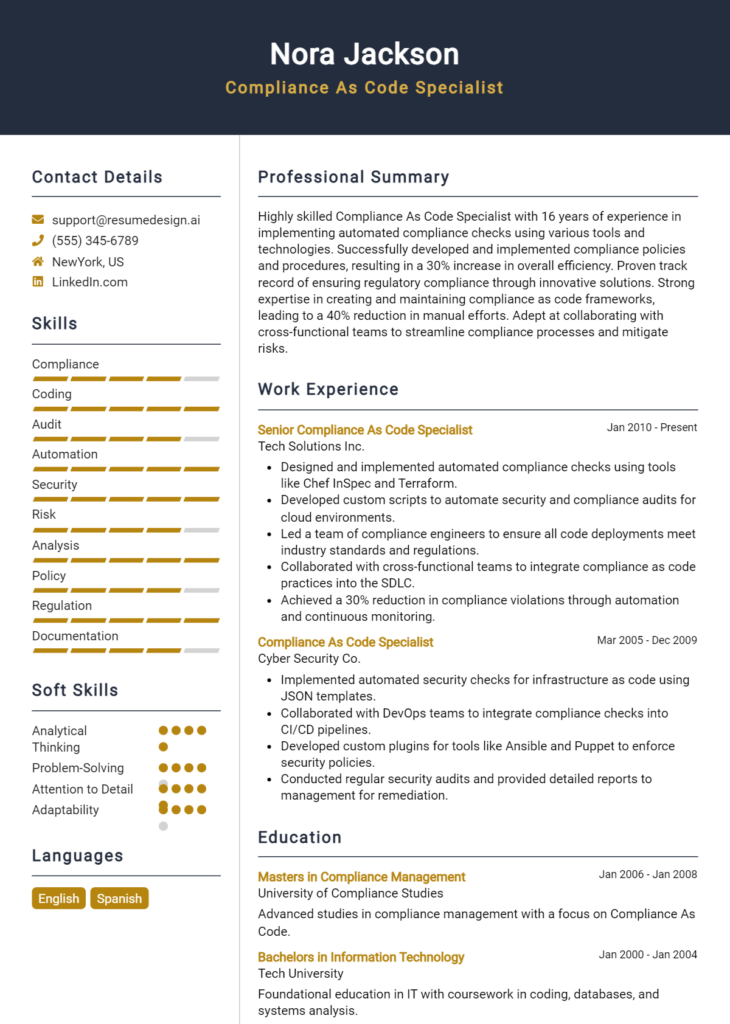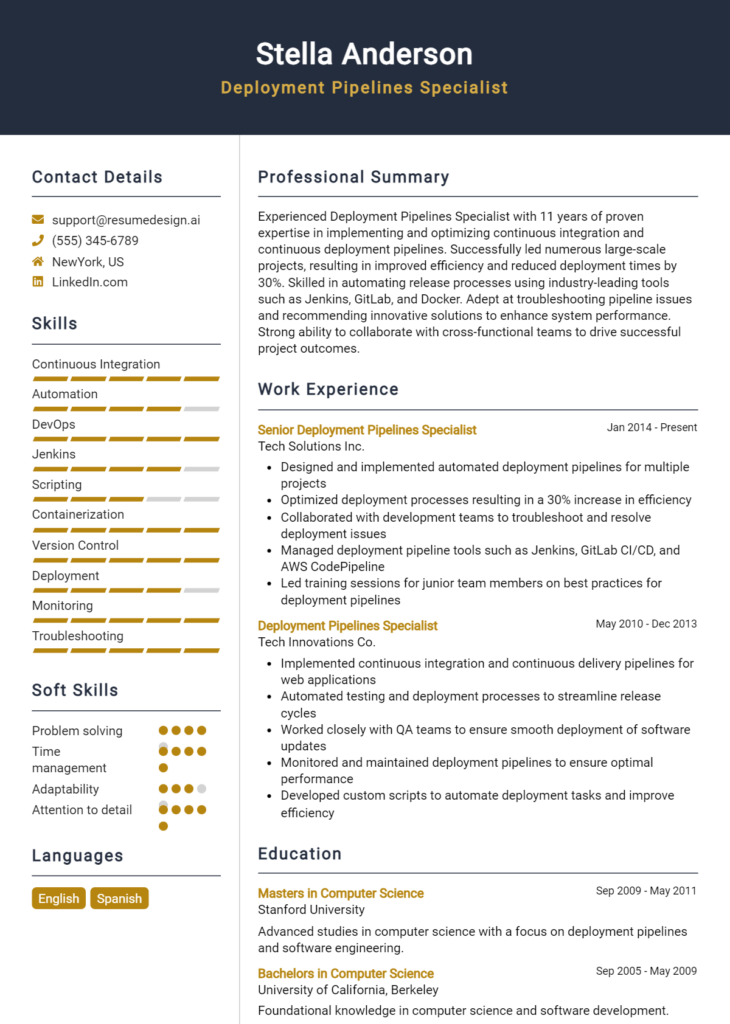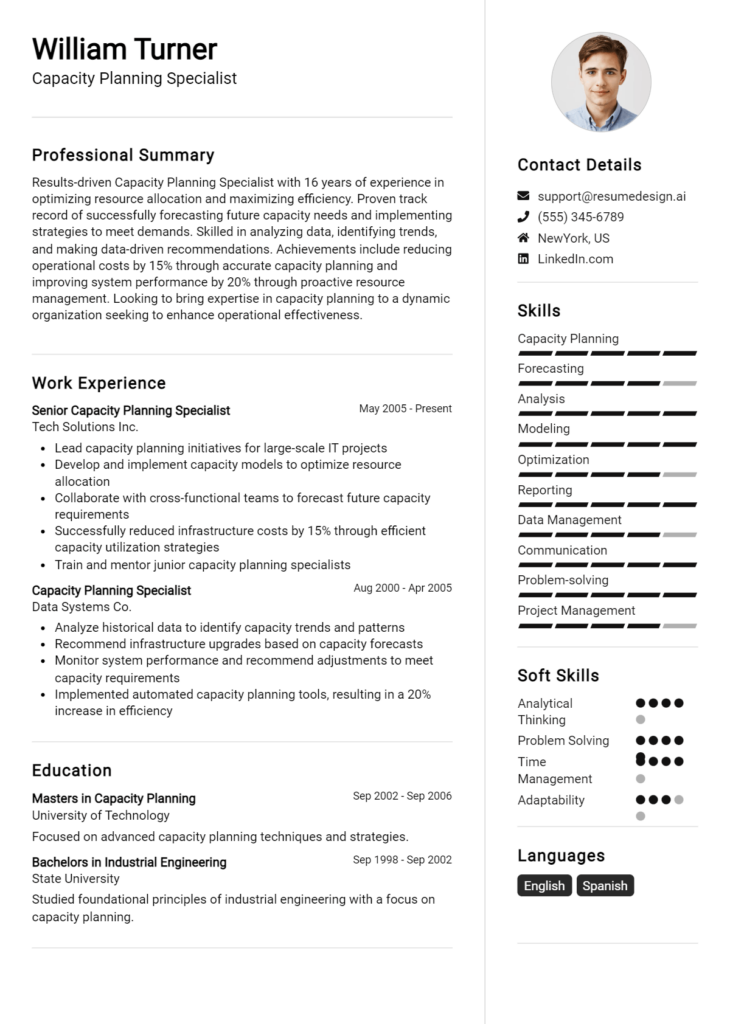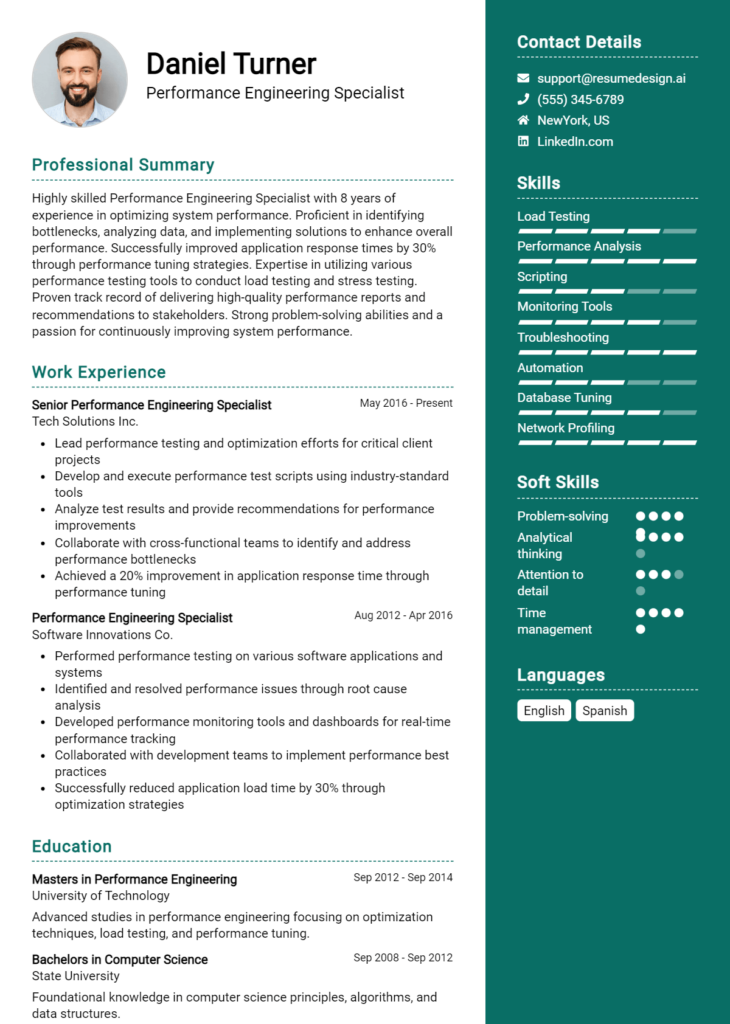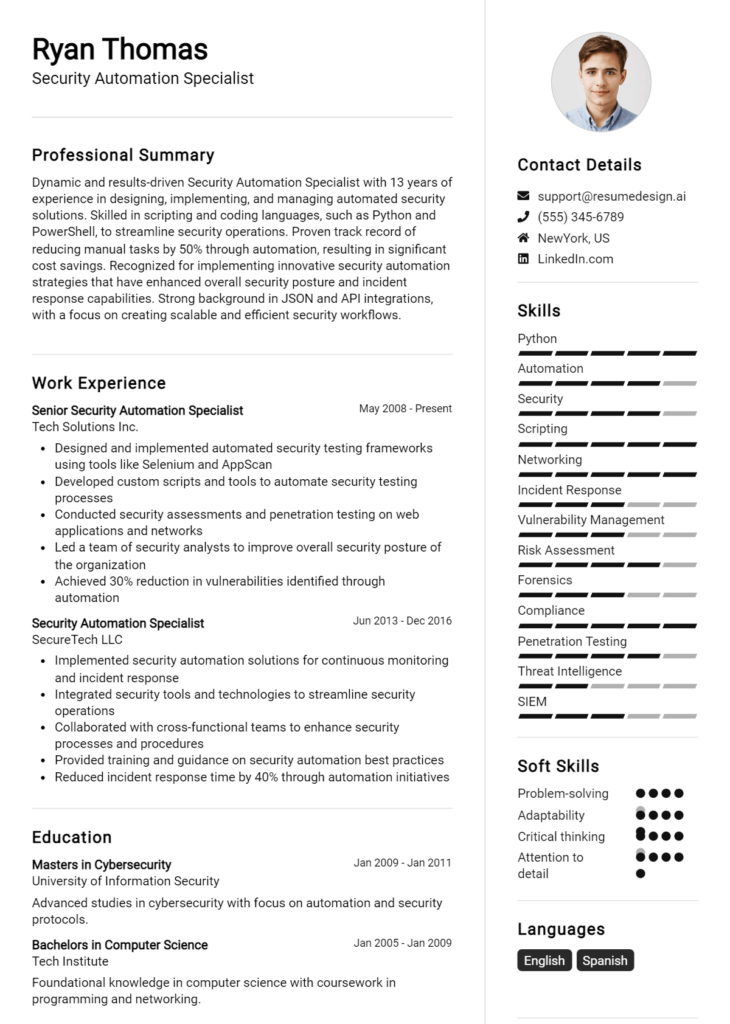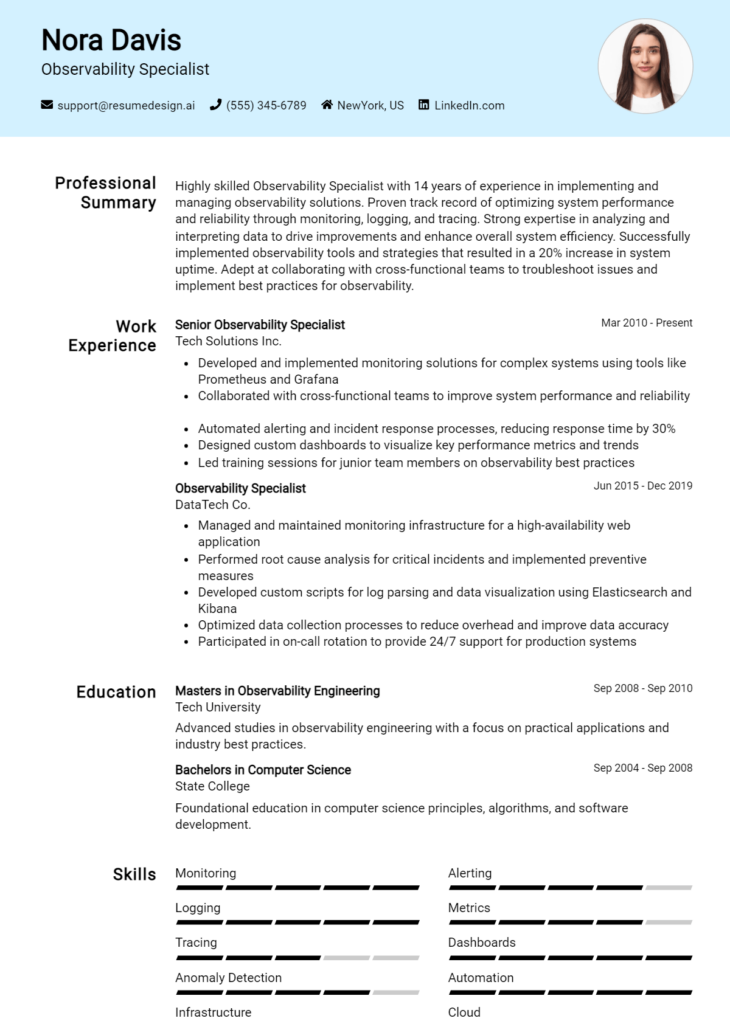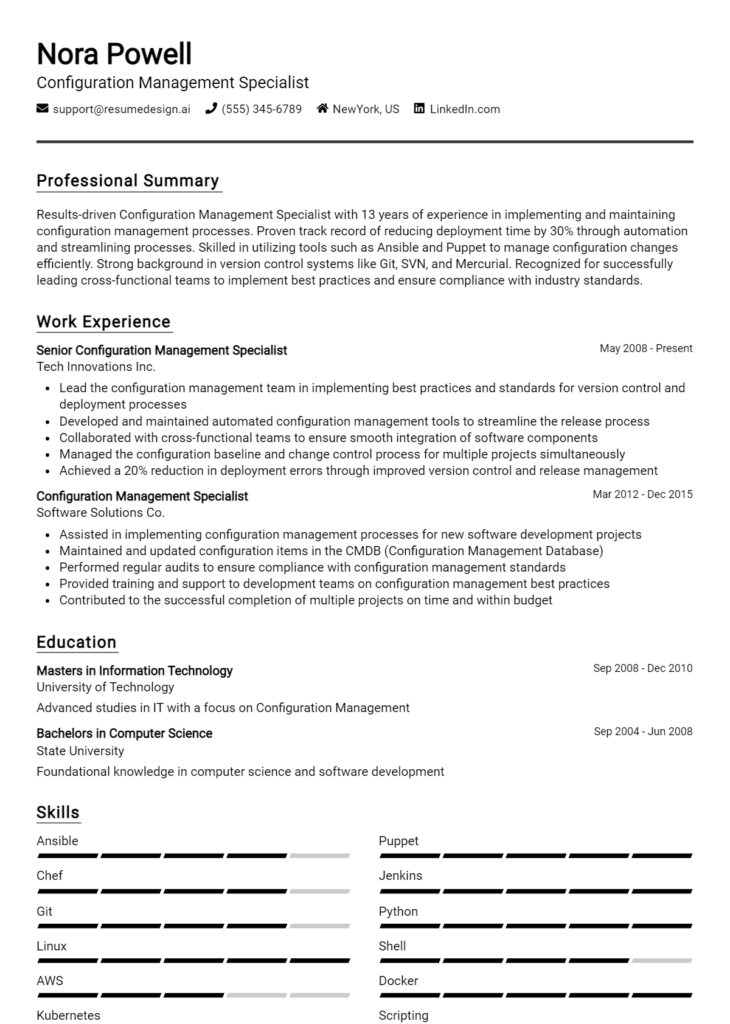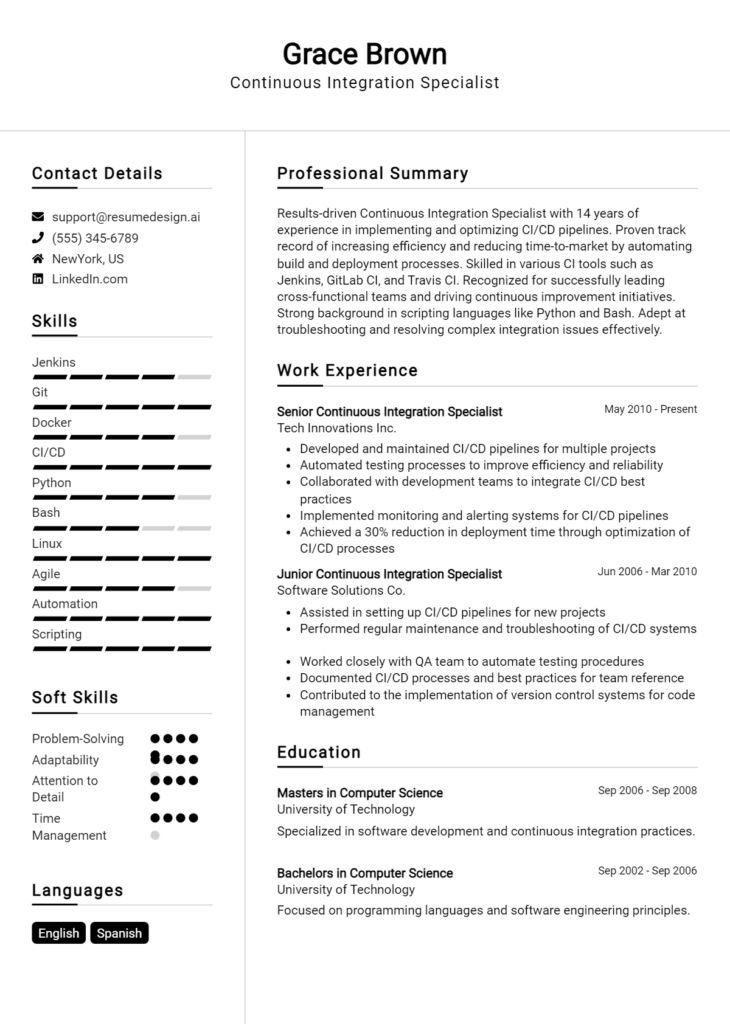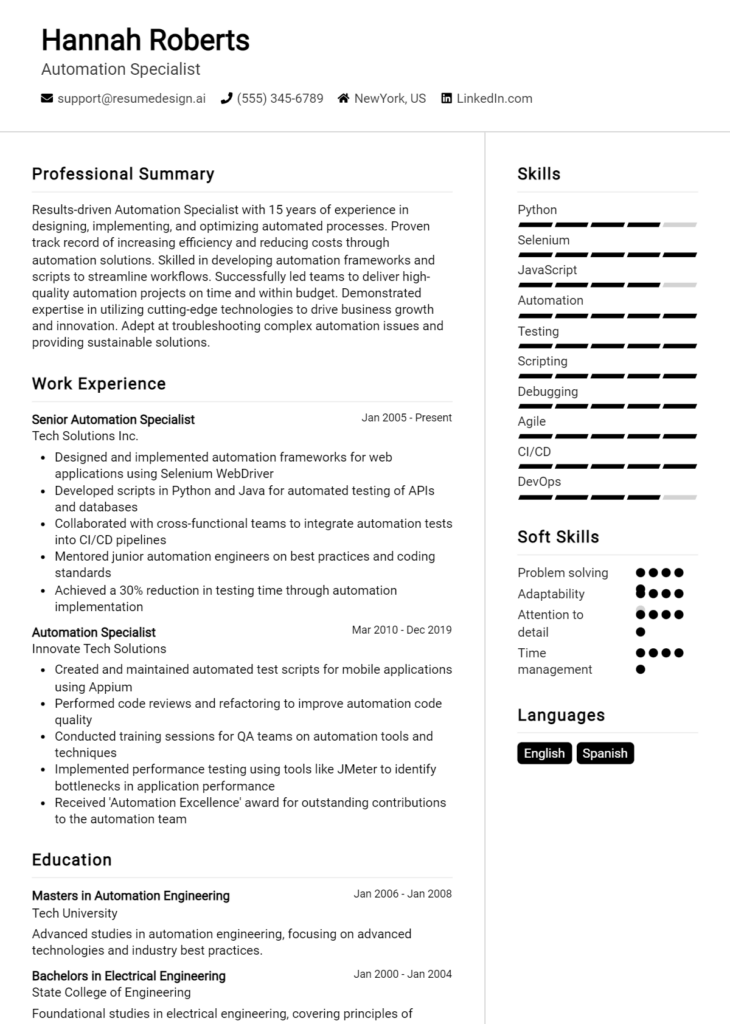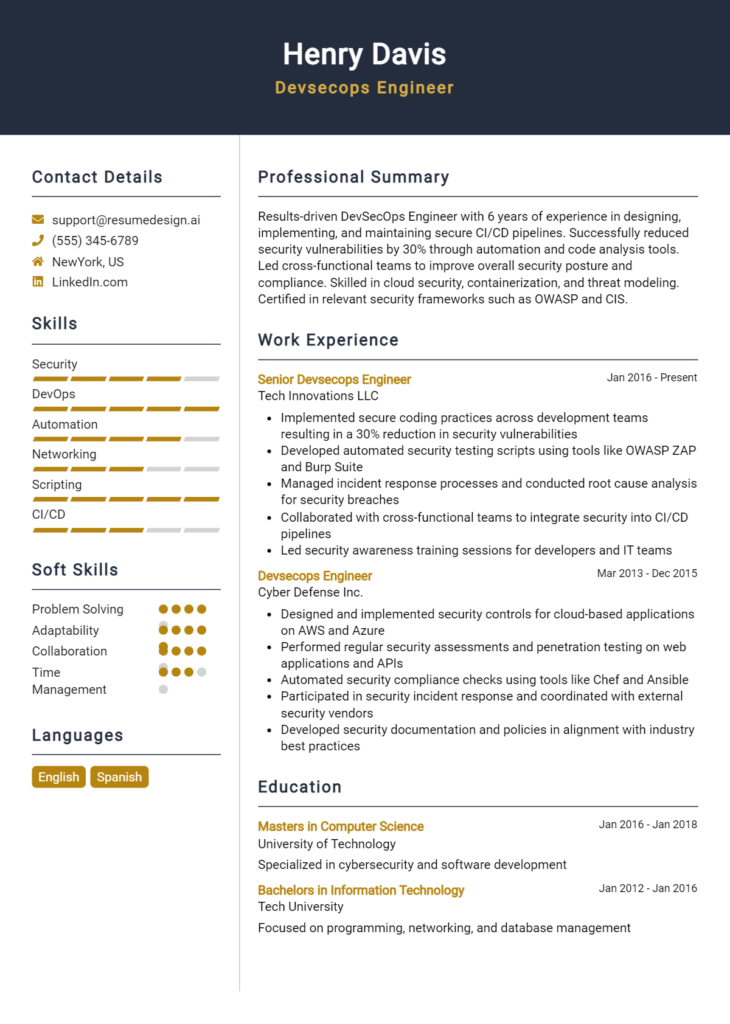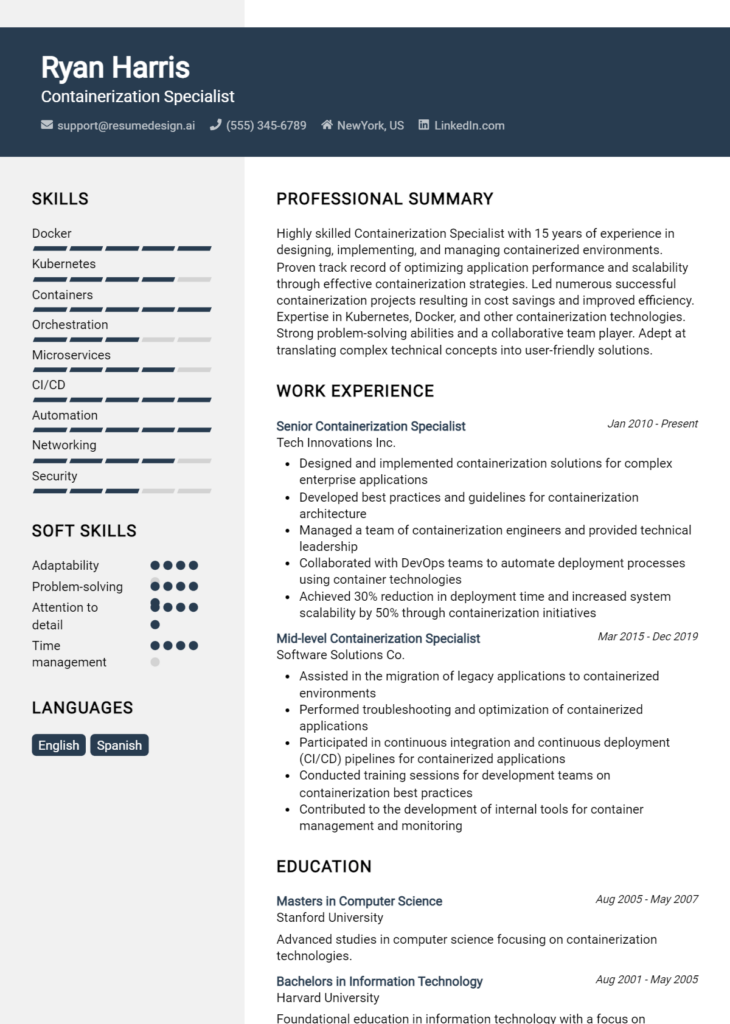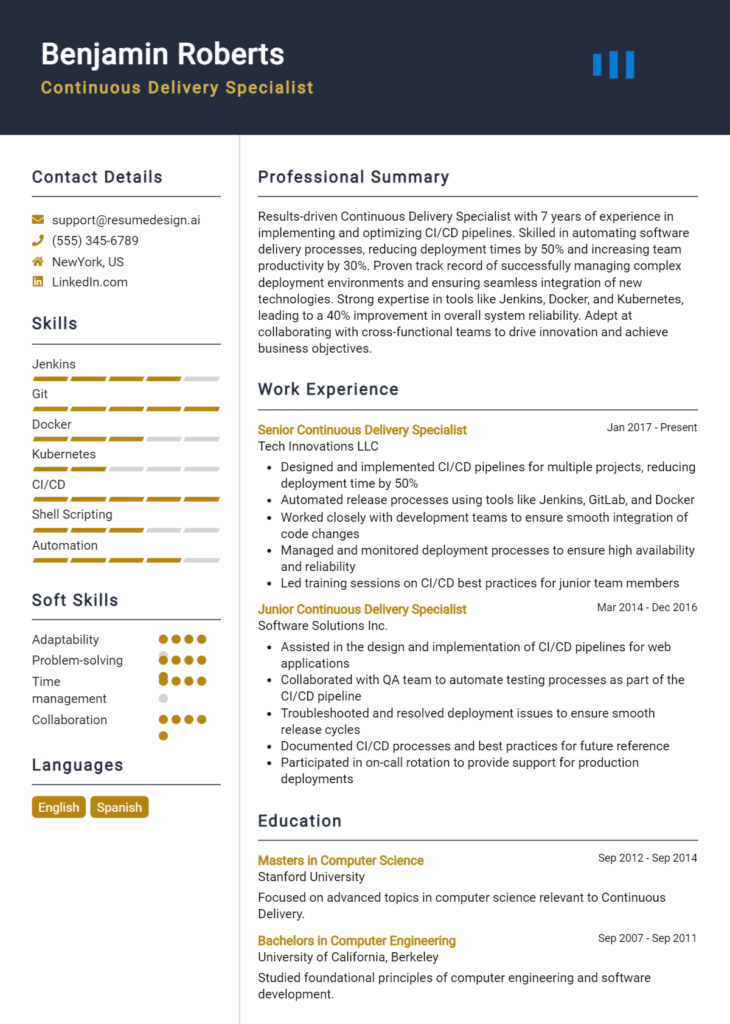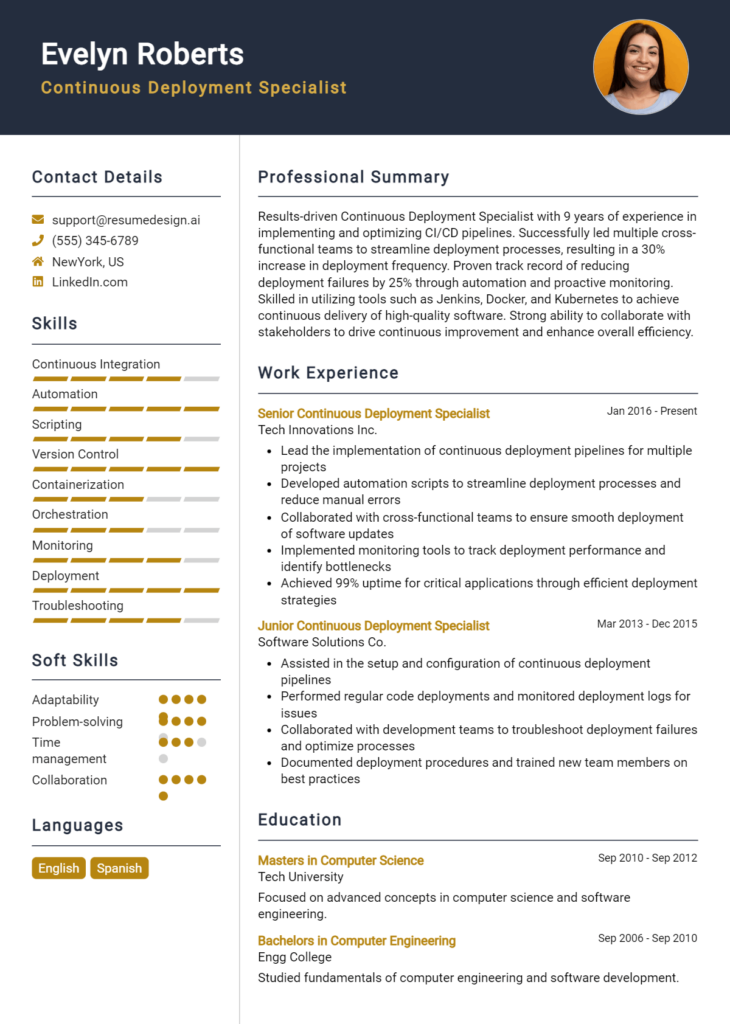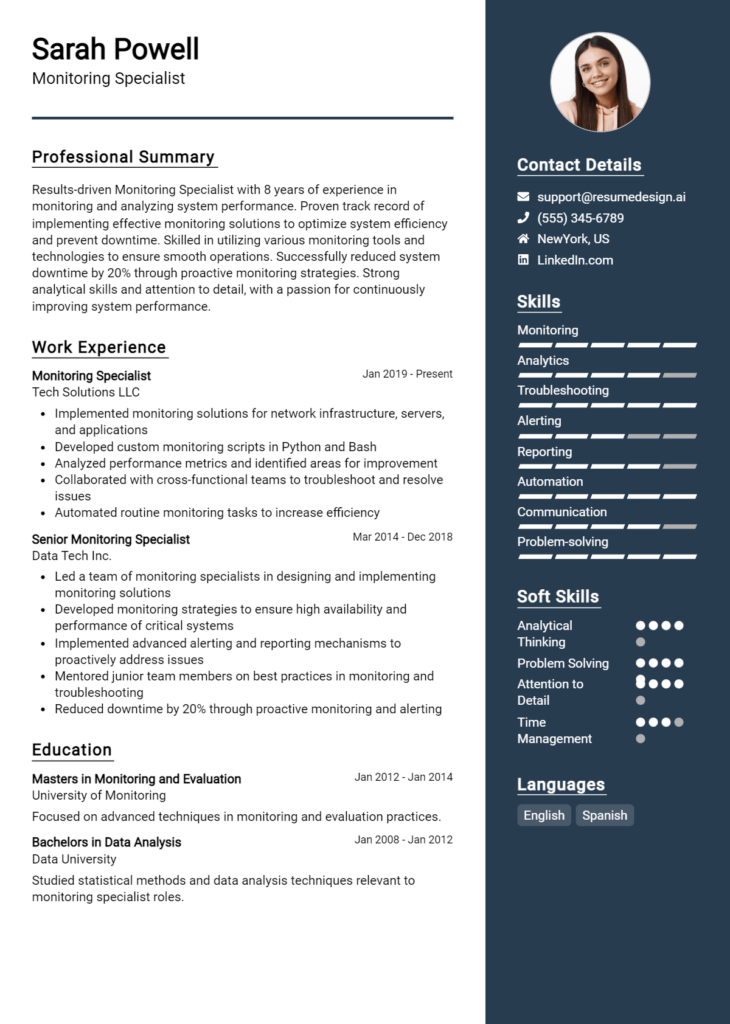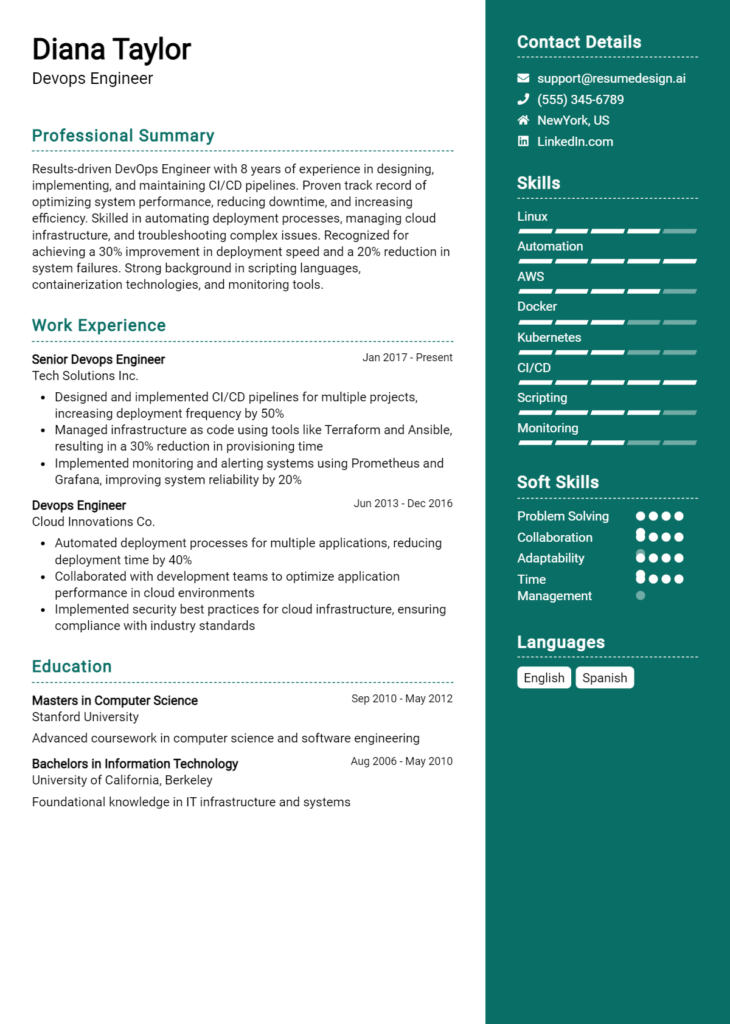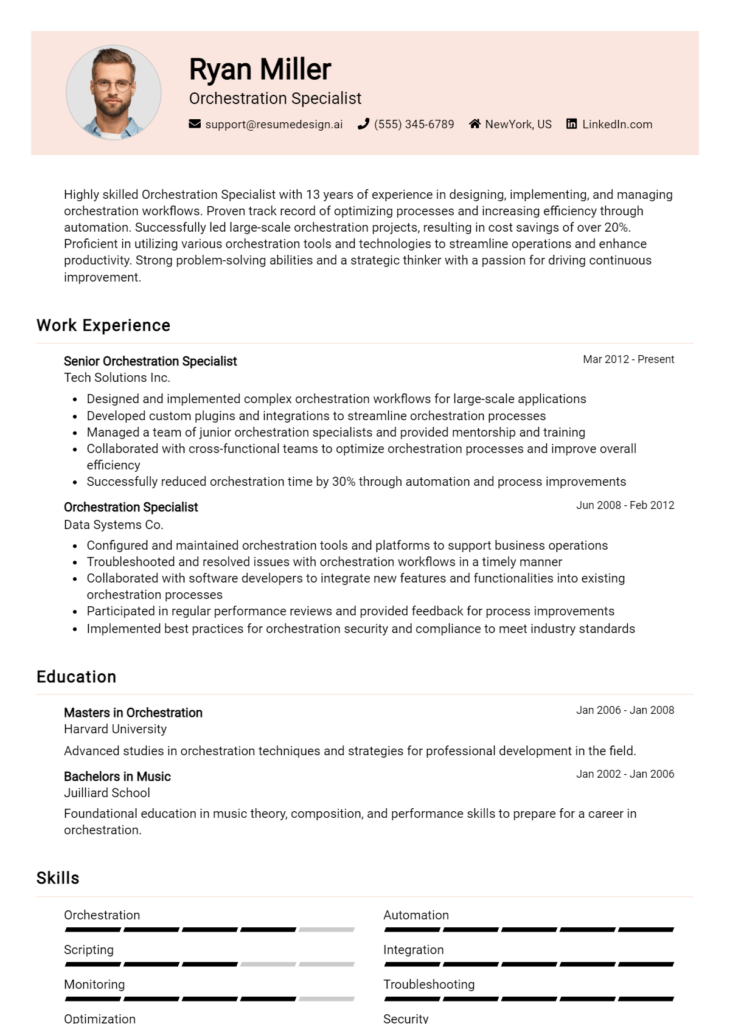Incident Response Specialist Core Responsibilities
An Incident Response Specialist plays a crucial role in safeguarding an organization’s digital assets by swiftly addressing and mitigating security incidents. This position requires a blend of technical expertise, operational acumen, and strong problem-solving skills to effectively collaborate across various departments, including IT, compliance, and risk management. Proficiency in incident detection, analysis, and response processes is essential. A well-crafted resume highlighting these competencies not only showcases qualifications but also demonstrates how these skills contribute to the organization's overall security posture and resilience.
Common Responsibilities Listed on Incident Response Specialist Resume
- Monitor security alerts and analyze potential threats.
- Investigate security breaches and incidents to determine their cause.
- Develop and implement incident response plans and procedures.
- Coordinate with IT teams to remediate vulnerabilities.
- Conduct post-incident reviews and prepare reports.
- Provide training and guidance to staff on security best practices.
- Stay updated on the latest cybersecurity trends and threats.
- Manage communication with stakeholders during incidents.
- Perform threat hunting and proactive security assessments.
- Collaborate with legal and compliance teams regarding regulatory requirements.
- Document incident response processes and create knowledge base articles.
High-Level Resume Tips for Incident Response Specialist Professionals
In the fast-paced and ever-evolving field of cybersecurity, a well-crafted resume is not just a document—it's a powerful tool that can open doors to new opportunities. For Incident Response Specialist professionals, your resume is often the first impression you make on potential employers, and it needs to effectively showcase both your skills and achievements. A strong resume highlights your ability to respond to security incidents, mitigate risks, and protect valuable assets, making it crucial to present your qualifications in a compelling manner. This guide will provide practical and actionable resume tips specifically tailored for Incident Response Specialist professionals, ensuring you stand out in a competitive job market.
Top Resume Tips for Incident Response Specialist Professionals
- Tailor your resume to the specific job description by incorporating relevant keywords and phrases.
- Highlight your technical skills, such as knowledge of cybersecurity tools, incident response frameworks, and threat analysis methodologies.
- Showcase relevant experience in incident response, detailing specific situations where you successfully managed security incidents.
- Quantify your achievements by including metrics, such as the number of incidents handled, response times, or percentage improvements in security posture.
- Include certifications relevant to the field, such as Certified Incident Handler (GCIH) or Certified Information Systems Security Professional (CISSP).
- Demonstrate your ability to work collaboratively with teams and communicate effectively with stakeholders during incidents.
- Use action verbs to convey your contributions clearly, such as "analyzed," "developed," "implemented," and "coordinated."
- Keep the format clean and professional, using bullet points for easy readability and ensuring consistency in font and style.
- Incorporate a summary or objective statement that succinctly outlines your career goals and what you bring to the table.
By implementing these tips, you can significantly enhance your resume and increase your chances of landing a job in the Incident Response Specialist field. A well-structured resume that effectively communicates your expertise and accomplishments will not only grab the attention of hiring managers but also position you as a strong candidate ready to tackle the challenges of cybersecurity incidents head-on.
Why Resume Headlines & Titles are Important for Incident Response Specialist
In the competitive field of cybersecurity, particularly for the role of an Incident Response Specialist, a well-crafted resume headline or title is crucial. This brief yet impactful phrase serves as the first impression a hiring manager receives, summarizing a candidate's key qualifications and setting the tone for the entire resume. A strong headline can immediately grab attention, showcasing the applicant's expertise in incident response, risk management, and cybersecurity protocols. It should be concise, relevant, and tailored to the specific job being applied for, ensuring that it effectively conveys the candidate's value proposition in a crowded job market.
Best Practices for Crafting Resume Headlines for Incident Response Specialist
- Keep it concise: Aim for no more than 10-12 words.
- Be role-specific: Use keywords relevant to the Incident Response Specialist position.
- Highlight key qualifications: Focus on certifications, skills, or experiences that set you apart.
- Use action-oriented language: Start with strong verbs that convey a sense of proactivity.
- Tailor to the job description: Align your headline with the specific requirements of the job.
- Avoid jargon: Use clear and straightforward language that everyone can understand.
- Showcase achievements: Incorporate quantifiable accomplishments where possible.
- Maintain professionalism: Ensure the tone reflects the seriousness of the role in cybersecurity.
Example Resume Headlines for Incident Response Specialist
Strong Resume Headlines
"Certified Incident Response Specialist with 5+ Years in Cybersecurity"
"Proven Track Record in Threat Detection and Mitigation"
"Expert in Incident Management and Cyber Threat Intelligence"
"Dynamic Incident Response Professional Specializing in Rapid Recovery"
Weak Resume Headlines
"Looking for a Job in Cybersecurity"
"IT Professional"
The strong headlines are effective because they directly communicate relevant expertise and experience, making it easy for hiring managers to see the candidate's qualifications at a glance. They utilize specific language that aligns with the job requirements, thereby enhancing the chances of capturing attention. Conversely, the weak headlines fail to make an impact due to their vagueness and lack of specificity, leaving hiring managers uncertain about the candidate's actual skills and suitability for the position. A compelling headline is essential in making a strong first impression in the competitive job market for Incident Response Specialists.
Writing an Exceptional Incident Response Specialist Resume Summary
A resume summary is a crucial component for an Incident Response Specialist as it serves as the first impression to hiring managers. A strong summary quickly captures attention by effectively showcasing key skills, relevant experience, and notable accomplishments that align with the job role. In an industry where quick thinking and expertise are paramount, a concise and impactful summary tailored to the specific job can distinguish candidates from the competition, ultimately leading to a greater likelihood of securing an interview.
Best Practices for Writing a Incident Response Specialist Resume Summary
- Quantify Achievements: Use specific metrics to demonstrate your impact, such as the number of incidents handled or reductions in response time.
- Focus on Skills: Highlight critical skills relevant to incident response, such as threat detection, forensics, and communication.
- Tailor the Summary: Customize your summary to align with the job description, ensuring that you address the key requirements outlined by the employer.
- Be Concise: Limit your summary to 3-5 sentences to maintain clarity and keep the reader’s attention.
- Use Action Words: Start sentences with strong action verbs to convey your proactive approach to incident response.
- Highlight Certifications: Mention relevant certifications like CISSP, CISM, or CEH to validate your expertise.
- Showcase Problem-Solving Skills: Emphasize your ability to troubleshoot and resolve incidents effectively under pressure.
- Include Soft Skills: Don’t forget to highlight interpersonal skills, such as teamwork and communication, which are vital in incident response scenarios.
Example Incident Response Specialist Resume Summaries
Strong Resume Summaries
Dedicated Incident Response Specialist with over 5 years of experience in detecting and mitigating cyber threats. Successfully reduced incident response time by 40% through the implementation of automated monitoring tools. Certified in CISSP and CEH, skilled in forensic analysis and threat intelligence.
Results-driven Incident Response Specialist, adept at leading cross-functional teams to manage over 200 security incidents annually. Improved incident resolution rates by 30% through strategic implementation of incident tracking systems. Proficient in Python and SIEM technologies, with a strong focus on continuous improvement.
Proactive Incident Response Specialist with a proven track record of identifying vulnerabilities and implementing robust security measures. Achieved a 50% decrease in security breaches in the last year by developing comprehensive incident response plans and training programs for staff.
Weak Resume Summaries
Experienced IT professional looking for a role in incident response. Good at solving problems and working with teams.
Incident Response Specialist with some experience in the field. I have skills in various areas but need to develop more.
The examples labeled as strong are considered effective because they provide specific accomplishments, quantifiable results, and relevant skills tailored to the role of an Incident Response Specialist. In contrast, the weak examples lack detail, fail to mention quantifiable outcomes, and present vague descriptions that do not convey the candidate's true potential or expertise in the field.
Work Experience Section for Incident Response Specialist Resume
The work experience section is a critical component of an Incident Response Specialist resume, as it serves to highlight the candidate's technical skills, leadership abilities, and their capacity to produce high-quality results in high-pressure environments. This section allows candidates to demonstrate their hands-on experience in addressing security incidents, managing teams, and implementing effective security measures. By quantifying achievements and aligning work experiences with industry standards, candidates can effectively showcase their value to potential employers and differentiate themselves in a competitive job market.
Best Practices for Incident Response Specialist Work Experience
- Highlight specific technical skills relevant to incident response, such as forensic analysis, malware detection, and network security.
- Quantify achievements with metrics, such as the number of incidents resolved, time taken to respond, or percentage reduction in security breaches.
- Emphasize leadership experience, including team management and cross-departmental collaboration during incident response efforts.
- Use action-oriented language to describe your contributions, showcasing initiative and ownership of projects.
- Align experiences with industry standards and frameworks, such as NIST, ISO, or SANS, to demonstrate familiarity with best practices.
- Include relevant certifications and training that enhance your qualifications for the role.
- Provide context for your work by outlining the challenges faced and the strategies employed to overcome them.
- Tailor the work experience section to reflect the specific requirements and responsibilities outlined in the job description.
Example Work Experiences for Incident Response Specialist
Strong Experiences
- Led a cross-functional team in the resolution of over 150 cybersecurity incidents, reducing average response time by 30% within six months.
- Developed and implemented a new incident response protocol that decreased incident recovery time by 40%, thereby enhancing organizational resilience.
- Conducted comprehensive forensic investigations for high-severity breaches, resulting in a 25% decrease in future incidents through improved security measures.
- Collaborated with external partners to conduct tabletop exercises, which improved team readiness and response effectiveness by 50% during real incidents.
Weak Experiences
- Helped with incident response tasks as needed.
- Worked on some security projects during my time at the company.
- Participated in team meetings discussing incident response strategies.
- Assisted in the implementation of security measures without specific outcomes or responsibilities.
The examples categorized as strong experiences provide clear, quantifiable outcomes and demonstrate a proactive approach to incident response, showcasing effective leadership and collaborative efforts. In contrast, the weak experiences lack specificity and measurable results, failing to convey the candidate's impact within previous roles. By focusing on concrete achievements and detailed contributions, candidates can better position themselves as valuable assets in the field of incident response.
Education and Certifications Section for Incident Response Specialist Resume
The education and certifications section of an Incident Response Specialist resume is crucial for establishing the candidate's credibility and expertise in the field. This section serves as a showcase for the candidate's academic background, relevant industry certifications, and commitment to continuous learning. By providing details about relevant coursework, specialized training, and recognized credentials, candidates can significantly enhance their qualifications and demonstrate their alignment with the demands of the role. A well-structured education and certifications section not only highlights a candidate's foundational knowledge but also their preparedness to tackle the complexities of incident response.
Best Practices for Incident Response Specialist Education and Certifications
- Focus on relevant degrees, such as Computer Science, Information Security, or Cybersecurity.
- Include industry-recognized certifications like Certified Information Systems Security Professional (CISSP) or Certified Ethical Hacker (CEH).
- List specific courses that pertain to incident response, digital forensics, or network security.
- Highlight ongoing education efforts, including workshops, webinars, or recent training sessions.
- Use clear and concise descriptions for each certification and course, emphasizing their relevance.
- Prioritize certifications that demonstrate advanced knowledge or specialization in incident response.
- Be mindful of the order: list the most relevant and recent qualifications first.
- Avoid including unrelated degrees or certifications that do not enhance your profile for the role.
Example Education and Certifications for Incident Response Specialist
Strong Examples
- Bachelor of Science in Cybersecurity, University of Technology (Graduated 2022)
- Certified Information Systems Security Professional (CISSP), (Issued 2023)
- Incident Response and Handling Course, SANS Institute (Completed 2023)
- Certified Ethical Hacker (CEH), (Issued 2022)
Weak Examples
- Bachelor of Arts in History, State University (Graduated 2010)
- Certified Microsoft Office Specialist (MOS), (Issued 2015)
- Introduction to Computer Science (Online Course, 2018)
- First Aid Certification, (Issued 2021)
The strong examples listed above are considered effective because they directly relate to the skills and knowledge required for an Incident Response Specialist, showcasing relevant degrees, certifications, and specialized training that enhance the candidate's profile. In contrast, the weak examples highlight educational qualifications and certifications that lack relevance to the incident response field, which can diminish the candidate's appeal to potential employers. Strong examples demonstrate a clear commitment to the profession, while weak examples suggest a lack of focus or outdated qualifications.
Top Skills & Keywords for Incident Response Specialist Resume
As an Incident Response Specialist, having the right blend of skills is crucial to effectively manage and mitigate security incidents. A well-crafted resume that highlights both hard and soft skills can significantly enhance your job prospects in this competitive field. Employers often seek candidates who not only possess technical expertise but also demonstrate strong interpersonal abilities. By showcasing your skills, you can illustrate your capability to respond to incidents swiftly and effectively, work collaboratively with teams, and communicate clearly with stakeholders. This balance is essential for building a successful career in incident response.
Top Hard & Soft Skills for Incident Response Specialist
Soft Skills
- Strong analytical thinking
- Excellent communication skills
- Team collaboration
- Problem-solving ability
- Attention to detail
- Adaptability
- Critical thinking
- Decision-making
- Time management
- Stress management
Hard Skills
- Incident detection and analysis
- Malware analysis
- Network forensics
- Security information and event management (SIEM)
- Threat hunting
- Digital forensics
- Knowledge of security frameworks (NIST, ISO)
- Incident response planning and execution
- Vulnerability assessment
- Understanding of cybersecurity threats and vulnerabilities
Incorporating these essential skills into your resume, along with relevant work experience, will help you stand out as a qualified candidate in the field of incident response.
Stand Out with a Winning Incident Response Specialist Cover Letter
I am writing to express my interest in the Incident Response Specialist position at [Company Name], as advertised on [Where You Found the Job Posting]. With a strong background in cybersecurity and a proven track record in incident response, I am confident in my ability to contribute effectively to your team and help enhance your organization's security posture. My experience in identifying, analyzing, and mitigating potential threats aligns well with the responsibilities outlined in your job description.
In my previous role at [Previous Company Name], I successfully led a team in responding to a range of security incidents, including data breaches and malware infections. By employing a systematic approach to incident management, I was able to reduce response times by 30% and minimize the impact on operations. My technical expertise in utilizing various security tools, such as SIEM systems and forensic analysis software, has equipped me with the skills necessary to assess vulnerabilities and implement proactive measures to safeguard sensitive data.
Collaboration and communication are key components of incident response, and I pride myself on my ability to work effectively with cross-functional teams. I have conducted numerous training sessions to enhance awareness of security best practices among staff, fostering a culture of vigilance and preparedness. I am eager to bring my experience in stakeholder engagement and incident reporting to [Company Name], ensuring seamless communication during crisis situations and maintaining compliance with industry regulations.
I am excited about the opportunity to contribute to [Company Name]'s mission of protecting critical information assets. I believe my blend of technical skills, practical experience, and a proactive mindset make me a strong candidate for the Incident Response Specialist role. I look forward to the possibility of discussing how I can support your organization's goals in cybersecurity. Thank you for considering my application.
Common Mistakes to Avoid in a Incident Response Specialist Resume
When crafting a resume for the role of an Incident Response Specialist, it is crucial to present your skills and experiences effectively. Many candidates make common mistakes that can undermine their chances of landing an interview. Understanding these pitfalls can help you create a compelling resume that highlights your expertise in incident response and cybersecurity. Here are some mistakes to avoid:
Vague Job Descriptions: Failing to provide specific details about your past roles can leave hiring managers unsure of your actual responsibilities and achievements.
Neglecting Relevant Certifications: Not including certifications such as CISSP, CEH, or GCIH can diminish your credibility, as these qualifications are often essential in the cybersecurity field.
Ignoring Soft Skills: While technical skills are vital, overlooking soft skills like communication and teamwork can be a missed opportunity to showcase your ability to work effectively in high-pressure situations.
Overly Technical Language: Using jargon or overly complex terminology can alienate recruiters who may not have a technical background. Aim for clarity and accessibility in your descriptions.
Lack of Quantifiable Achievements: Failing to include metrics or results from your previous experiences can make your accomplishments seem less impactful. Use numbers to illustrate your success where possible.
Formatting Issues: A cluttered or inconsistent format can make your resume hard to read. Ensure that your layout is clean, professional, and easy to navigate.
Not Tailoring the Resume: Submitting a generic resume without customizing it for the specific job can signal a lack of interest or effort. Tailoring your resume to match the job requirements demonstrates your enthusiasm for the position.
Omitting Contact Information: Forgetting to include your contact details, such as a phone number or email address, can lead to missed opportunities. Always double-check that this information is clearly visible at the top of your resume.
Conclusion
As an Incident Response Specialist, your role is crucial in mitigating cyber threats and ensuring the security of your organization. Throughout this article, we’ve explored the essential skills and qualifications necessary for success in this dynamic field. Key areas of focus include effective communication, analytical thinking, technical expertise, and the capacity to work under pressure. Additionally, we discussed the importance of staying updated with the latest security trends and threats, as well as the value of certifications such as CISSP, CEH, and CISM.
In conclusion, as you consider your career trajectory as an Incident Response Specialist, it’s vital to ensure that your resume reflects your unique skills and experiences in this competitive landscape. A well-crafted resume can make a significant difference in capturing the attention of hiring managers.
We encourage you to take the time to review and refine your Incident Response Specialist resume. To assist you in this process, consider utilizing a variety of resources available to enhance your application. Explore our resume templates, leverage the easy-to-use resume builder, and check out resume examples tailored for your field. Don’t forget to create a compelling first impression with our cover letter templates. Start today and position yourself as the ideal candidate in the ever-evolving realm of incident response.

